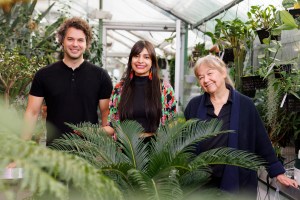Tag: Engineering & Technology
-
Campus & Community
‘Digital immigrants’ teaching ‘digital natives’
Students coming into universities today are “digital natives” and fundamentally different in their use of technology than the “digital immigrants” who teach them, according to John Palfrey, executive director of the Berkman Center for Internet & Society.
-
Campus & Community
21st century technology takes students back to 17th century
In 1998 cellist Yo-Yo Ma took to the road, and a growing number of people have followed him.
-
Nation & World
Advances in genetics can help kids learn
Education was becoming a no-brainer, some people at Harvard’s Graduate School of Education (HGSE) complained. Kurt Fischer and his colleagues looked at the revolution in brain scanning, genetics, and other biological technologies and decided that most teachers and students weren’t getting much benefit from them.
-
Campus & Community
Radhika Nagpal nets prestigious NSF award for up-and-coming researchers
Radhika Nagpal, assistant professor of computer science in Harvard’s School of Engineering and Applied Sciences (SEAS), has won a Faculty Early Career Development Award from the National Science Foundation (NSF). The honor is considered one of the most prestigious for up-and-coming researchers in science and engineering.
-
Campus & Community
John Lyell Sanders Jr.
John Lyell Sanders, Jr., served on the Harvard faculty for a total of thirty seven years and as Gordon McKay Professor of Structural Mechanics for over thirty years from 1964 until his retirement in 1995.
-
Arts & Culture
West Bank youths, with cameras, visit CGIS
Four teenage participants from the Picture Balata workshop made a stop at Harvard this past Wednesday evening (April 11) as part of their two-week tour of the United States. The teenagers, Palestinians from Balata Refugee Camp outside of Nablus, West Bank, visited the Center for Government and International Studies (CGIS), where they displayed their work…
-
Science & Tech
Libraries, museums meet with IT
The ability to search the actual text of millions of books — instead of just titles or summaries — will change the way students and academics conduct research, revealing a host of new sources invisible to current search methods, a Harvard University Library official working on the Google project said on March 28.
-
Science & Tech
Collaboration yields first citywide network of wireless sensors
Harvard University, BBN Technologies, and the city of Cambridge have begun a four-year project to install 100 wireless sensors atop streetlights in Cambridge, Mass., creating the world’s first citywide network of wireless sensors.
-
Campus & Community
Accelerating science with innovative computing
How daunting a task is it, in an age when it is possible to visualize structures and to see them at magnifications not even dreamed of a short time ago, to produce a “wiring diagram” of the human brain?
-
Nation & World
Legal, ethical limits to bioengineering debated
It is a truism that “politics makes strange bedfellows,” but late Tuesday afternoon (March 20), in the Ames Courtroom of Harvard Law School’s (HLS) Austin Hall, bioethics made two sets of philosophical bedfellows as strange as any Washington has seen.
-
Science & Tech
Undergrads to compete at Programming Contest
A group of Harvard undergraduates will travel to Tokyo to compete in the Association for Computing Machinery’s 31st annual International Collegiate Programming Contest (ACM-ICPC) on March 12-16. More than 6,000 teams, representing 1,756 universities from around the globe, participated in the regional competitions last fall. The top 88 teams earned coveted spots on the 2007…
-
Campus & Community
New York City mayor to receive award, deliver remarks at KSG
Michael R. Bloomberg, mayor of New York City, will receive the Pathfinder Award Friday (March 2) from the Leadership for a Networked World (LNW) Program at the Kennedy School of Government (KSG). Bloomberg will also deliver remarks before an audience of invited guests at the School’s Wiener Auditorium beginning at 4 p.m. and will be…
-
Science & Tech
Symposium: ‘Will brain imaging be lie detector test of the future?’
For almost a century, one of the staples of crime stories has been the wires, cuffs, and jiggling recording needle of the polygraph machine. In its time, the “lie detector” was hailed as a way to measure the telltale physiological signs of deception, including hard breathing, high blood pressure, and excess perspiration. But in truth,…
-
Campus & Community
Former Arboretum director Ashton wins Japan Prize
Peter Shaw Ashton, the Charles Bullard Professor of Forestry Emeritus and former director of the Arnold Arboretum, has won the prestigious Japan Prize for his “significant contributions towards solving the conflict between human beings and the tropical forest ecosystem.”
-
Campus & Community
DARPA funds new initiative at Harvard
The Defense Advanced Research Projects Agency (DARPA) recently announced its funding of a new multi-institution research initiative in nano- and micro-electro-mechanical systems (NEMS/MEMS) in affiliation with Harvard’s programs in engineering and applied sciences. The three-year program has more than $2 million in total funding from DARPA and industry partners.
-
Campus & Community
Sengupta wins $4.1 million ‘Era of Hope’ award for breast cancer advances
An assistant professor of medicine at Harvard has won a $4.1 million “Era of Hope” scholar award from the U.S. Defense Department’s Breast Cancer Research Program in support of his cutting-edge, interdisciplinary research aimed at fighting breast and other types of cancer.
-
Science & Tech
Visualization Lab provides data in three dimensions
On the second floor of the Peabody Museum, in a darkened room painted flat black, Harvard geologist John Shaw slips on a pair of futuristic goggles as he sits before a 23-foot-wide wrap-around screen.
-
Health
Nanowire arrays can detect signals along individual neurons
Opening a whole new interface between nanotechnology and neuroscience, scientists at Harvard University have used slender silicon nanowires to detect, stimulate, and inhibit nerve signals along the axons and dendrites of live mammalian neurons.


